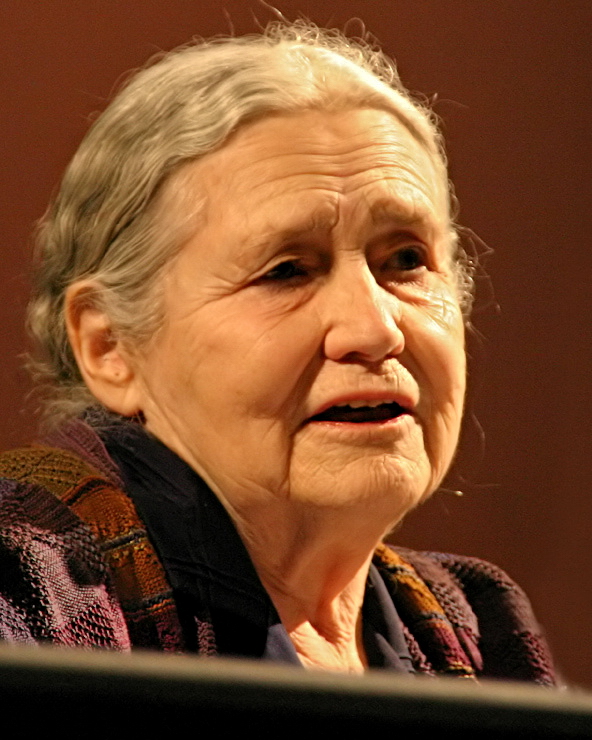Zdroj: [Pro spisovatelku Lessingovou znamená Nobelova cena "katastrofu", novinky.cz, 2008-05-13, 2013-05-23, http://www.novinky.cz/kultura/139670-pro-spisovatelku-lessingovou-znamena-nobelova-cena-katastrofu.html]
Doris Lessingová nejznámější citáty
Doris Lessingová: Citáty anglicky
The Summer Before the Dark (1973)
“What is a hero without love for mankind?”
Was ist ein Held ohne Menschenliebe!
Gotthold Ephraim Lessing, Philotas (1759), Act 1, Scene 7 http://www.gutenberg.org/dirs/etext05/8phts10.txt
Misattributed
In interview, quoted in part 1 of Useful Idiots - BBC World Service (7 July 2010) https://web.archive.org/web/20101008193804/http://www.bbc.co.uk/worldservice/documentaries/2010/07/100624_doc_useful_idiots_lenin.shtml part 1 on iTunes https://itunes.apple.com/us/podcast/useful-idiots/id438700488?i=1000094122641&mt=2
Käthe Kollwitz, diary entry (1 January 1912)
Misattributed
“There are no laws for the novel. There never have been, nor can there ever be.”
As quoted in Writers on Writing (1986) by Jon Winokur
“Literature is analysis after the event.”
Quoted in Children of Albion: Poetry of the Underground in Britain, ed. Michael Horovitz (1969): Afterwords, section 2
quoted in "A Talk With Doris Lessing; Lessing Author's Query" (30 March 1980), Minda Bikman, New York Times Book Review
As quoted in an undated profile at the BBC World Service http://www.bbc.co.uk/worldservice/arts/features/womenwriters/lessing_being.shtml
“It is the mark of great people to treat trifles as trifles and important matters as important.”
Denn zu einem großen Manne gehört beides: Kleinigkeiten als Kleinigkeiten, und wichtige Dinge als wichtige Dinge zu behandeln.
Gotthold Ephraim Lessing, Hamburgische Dramaturgie (1767 - 1769), Vierunddreißigstes Stück Den 25. August 1767 http://www.gutenberg.org/files/10055/10055-8.txt
Misattributed
“Think wrongly, if you please, but in all cases think for yourself.”
Interview with Amanda Craig, "Grand dame of letters who's not going quietly," The Times, London (23 November 2003)
Varianta: Think wrongly, if you please, but in all cases think for yourself.
“Space or science fiction has become a dialect for our time.”
The Guardian, London (7 November 1988)
As quoted in An Uncommon Scold (1989) by Abby Adams, p. 18
As quoted in Wisdom for the Soul: Five Millennia of Prescriptions for Spiritual Healing (2006) by Larry Chang, p. 660
“The worst of superstitions is to think
One's own most bearable.”
Gotthold Ephraim Lessing, Nathan the Wise (1779), Act IV, scene II http://www.gutenberg.org/dirs/etext03/natws10.txt
Variant translation: The worst superstition is to consider our own tolerable.
Misattributed
“I have found it to be true that the older I've become the better my life has become.”
Rush Limbaugh, as quoted in Old Age Is Always 15 Years Older Than I Am (2001) by Randy Voorhees
Misattributed
“Man, whence is he? / Too bad to be the work of a god, too good for the work of chance.”
Gotthold Ephraim Lessing, as quoted in Dictionary of Quotations from Ancient and Modern English and Foreign Sources (1899) by James Wood, p. 61; usually attributed to Doris Lessing in the form: "Man — who is he? Too bad, to be the work of God: Too good for the work of chance!"
Misattributed
Salon interview (1997)
quoted in "Doris Lessing on Feminism, Communism and Space Fiction" http://www.nytimes.com/books/99/01/10/specials/lessing-space.html (25 July 1982), Lesley Hazelton, New York Times Book Review
I, who ne'er
Went for myself a begging, go a borrowing,
And that for others. Borrowing's much the same
As begging; just as lending upon usury
Is much the same as thieving.
Gotthold Ephraim Lessing, Nathan the Wise (1779), Act II, scene II http://www.gutenberg.org/dirs/etext03/natws10.txt
Misattributed
"Literature Nobel Awarded to Writer Doris Lessing" http://www.npr.org/templates/story/story.php?storyId=15195588 All Things Considered NPR (11 October 2007)
Boston Book Review interview by Harvey Blume http://www.dorislessing.org/boston.html (February 1998)
After being chosen as the 2007 recipient of the Nobel Prize For Literature "BBC News", BBC, London (11 October 2007)
"Unexamined Mental Attitudes Left Behind By Communism" http://www.dorislessing.org/unexamined.html, in Our Country, Our Culture - The Politics of Political Correctness (1994), Partisan Review Press, edited by Edith Kurzweil and William Philips
“Parents should leave books lying around marked "forbidden" if they want their children to read.”
Interview with Amanda Craig, "Grand dame of letters who's not going quietly," The Times, London (23 November 2003) http://www.timesonline.co.uk/article/0,,14449-1132868_3,00.html
